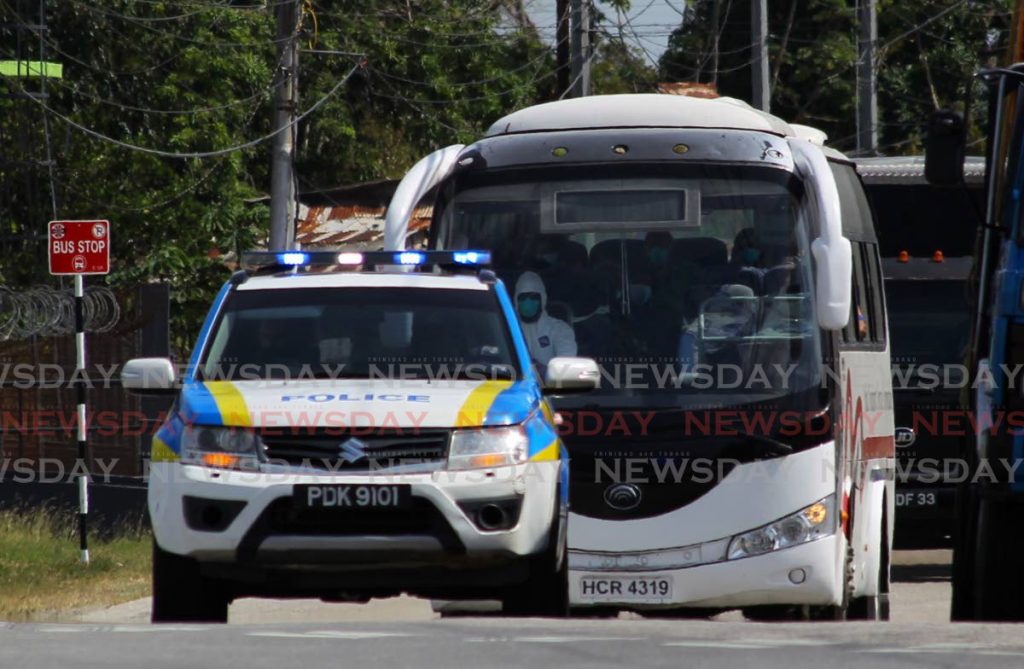WHAT ABOUT US?

ONE DAY after 33 Trinidadians returned home after being stranded in Barbados, the group stuck in Suriname asked government on Wednesday – what about us?
On Tuesday, the group of 33 Trinis who were originally on a cruise in Dubai, were allowed back home and are now in a mandatory 14-day quarantine at the National Racquet Centre in Tacarigua. Things are getting grim for the TT nationals in Suriname. They are running out of food and money.
"It might be cheaper to bring us back in body bags," one of the men told Newsday in an interview by telephone on Wednesday. The group of about 40 including engineers, accountants and three footballers, were left stranded in Suriname after TT closed its borders on March 23. Many of them have been in Suriname since February.
They say their rations are quickly running out and many of them are no longer receiving a per diem from their employers, so their cash is running low. The 40 are spread across different areas of Paramaribo and while at least two employers of a group of 15, are sending them money to survive, the majority of them said they are not so lucky since many of them work for Suriname-based companies.
“It is six weeks since some of us have been out of work and we are not earning any money,” one of the men said. They have asked that their names remain anonymous since they are afraid of the backlash. They also said they have seen the negative comments on social media and want to protect their families in TT.
One group said their employer rented them apartments which they share. Others are not so lucky since, on Sunday, some of them were evicted from where they were staying.
At Wednesday’s virtual press conference on covid19 measures in TT, National Security Minister Stuart Young advised TT nationals stranded outside to “shelter in place” since allowing anyone back in, at this time, poses a risk to citizens.
He spoke of sending care packages to TT students at the University of the West Indies’ campuses in Jamaica and Barbados but noted that he has spoken to some employers of those Trinis stranded in Suriname and was told they were being well stocked with money.
Young also said Government has been in constant collaboration with the Suriname government. Last week, officials in Suriname requested components of test kits to test the TT nationals for covid19. The minister did not say if the components asked for will be sent, or when, only that they were in correspondence with officials in Suriname.
Young said TT can't ease restrictions on the borders to allow for a second wave of the coronavirus to hit TT. He said the measures in place are to protect citizens in the country. He advised nationals in other countries, including Margarita and on cruise ships where they work, to "shelter in place" where they are.
"We cannot reopen our borders," he said, adding that despite this he has granted exemptions, including to the Barbados group. "We will continue to look at the requests," he added. The Suriname group has hired attorneys Gerald Ramdeen and Umesh Maharaj to represent them.
On Tuesday, Young told Maharaj by e-mail, he would get back to them after looking at the recent proposals, which included testing. Maharaj told Young that many of the Trinis in Suriname are anxious to return home and fear the Government had abandoned them. At Wednesday's virtual briefing, Young acknowledged the pain and frustration felt by the stranded nationals.
Speaking to Newsday, the men said the longer they stay in Suriname, the more strain it places on their families back home and their respective employers. “We suffer in silence. We are not getting anything and are fighting to get food,” one said. They called on Young to tell them which employer he had spoken to because most of them have not been able to buy food.
Prices for basic food items have sky-rocketed in Suriname and the men are pooling their meagre resources to buy the essentials. They also said they have not heard from the TT mission in Suriname, on the request for test kit components so they can be tested.
Many of them have been in Suriname for more than two months. They had a flight back to TT on March 23, but that was scuttled after the flight crew called in sick. They had hoped TT would let them back the next day, but their request to return home was refused.
“We were back and forth, going to the airport. We thought that since it was a few hours after the border closed, they would have allowed us in.”
Suriname reported its first positive case on March 13 and most of the men said they have no symptoms of the coronavirus. As of Wednesday, according to the worldometer website which tracks progression of the virus in real time, Suriname had ten cases with one death.
One of the oil and gas workers told Newsday his family in Trinidad has had to dip into savings to make ends meet since he is no longer employed with the Suriname company he worked for on contract. Like some of his co-workers, his salary was deposited straight into his TT bank account. He has no access to that money and is unable to open a bank account in Suriname.
He said this has been hard on his children. His young daughter cries on the phone almost nightly, asking him why he isn’t on the plane. He has had to lie to her, telling her the plane needed fueling and that he will be home soon.


Comments
"WHAT ABOUT US?"